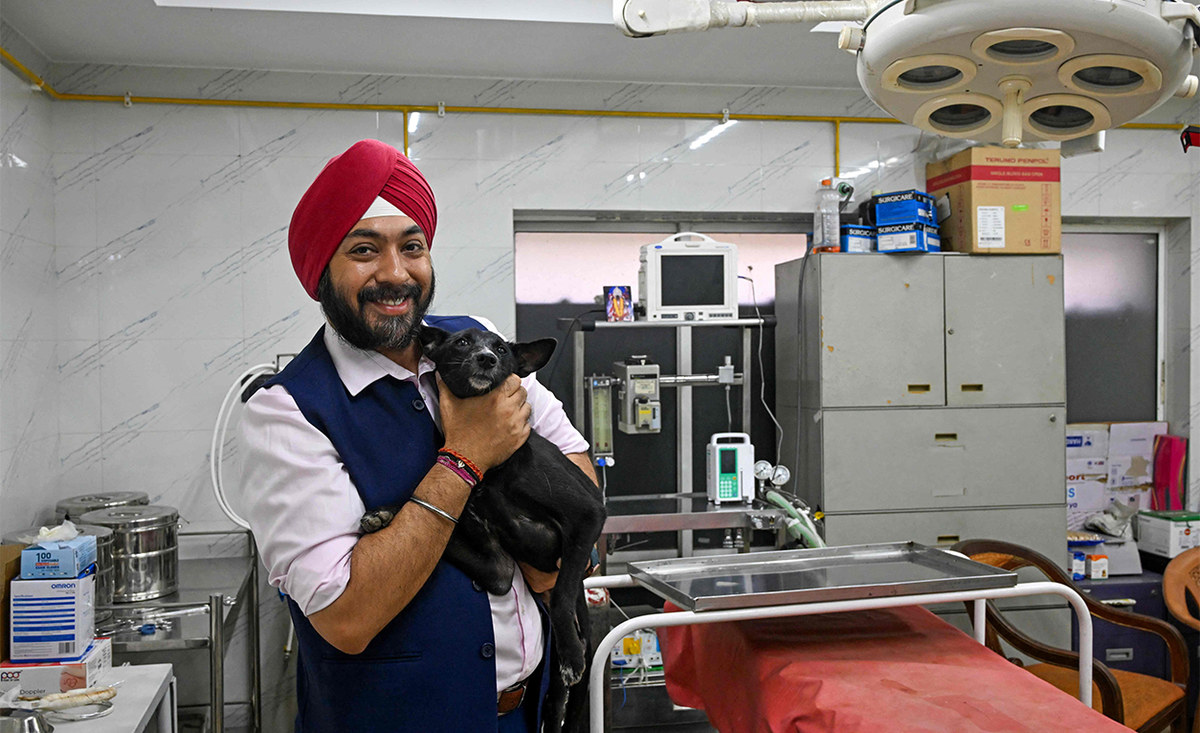Kolkata: Soaring temperatures across Kolkata have brought life in much of the Indian megacity to a standstill, but veterinarian Partha Das cannot recall a time when he was more busy.
His clinic has been swamped by distressed members of the public carrying in beloved pets suffering nosebleeds, severe skin rashes and lapses into unconsciousness in a relentless heatwave suffocating much of South and Southeastern Asia over the past week.
“Many pets are also hospitalized for three or four consecutive days, and they are taking a long time to get back to normal,” the 57-year-old told AFP from his surgery.
“We are getting several heatstroke cases in a day. It’s unprecedented.”

Dogs sit in a cage as they wait to be treated for heat burns, at a pet clinic in Kolkata on April 30, 2024. (AFP)
Kolkata has sweltered through days of punishing heat, peaking at 43 degrees Celsius for the hottest single April day since 1954, according to the city’s weather bureau.
Streets of the normally bustling colonial-era capital have been almost deserted in the afternoons as its 15 million people do what they can to stay out of the sun.
But even cats and dogs lucky enough to have an owner have been susceptible to falling ill, with Das saying the heat had triggered a surge in dehydration-related illnesses in pets from around the city.
Teacher Sriparna Bose said her two cats had become sullen and withdrawn in a way she hadn’t seen before when the heatwave hit.
“They are refusing food,” she said. “They hide in dark, cold corners of the room and won’t come out.”
The situation is worse for the 70,000 stray dogs estimated to live on city streets by municipal authorities, which have no owner but are often fed and tended to by nearby residents.
Many are spending the day taking refuge from the sun under parked cars, while a lucky few are hosed down by sympathetic humans to help them cool off.
“They are finding it difficult to stand on their soft paws because the roads are so hot,” said Gurshaan Kohli of Humanimal Foundation, a local animal welfare charity for stray animals.

Gurshaan Kohli of Humanimal Foundation poses for a photograph with a wounded stray dog at a veterinary clinic in Kolkata on April 30, 2024. (AFP)
“Scores of dogs and cats have died” even though he and his colleagues had rushed them to clinics for treatment, he added.
Large swathes of South and Southeast Asia are struggling through a heatwave that has broken temperature records and forced millions of children to stay home as schools close across the region.
Experts say climate change makes heatwaves more frequent, longer and more intense, while the El Nino phenomenon is also driving this year’s exceptionally warm weather.
The heat has taken its toll on animals across the continent.
“They are eating less, and they are reluctant to move,” Henna Pekko of Rescue PAWS, which operates an animal shelter near Thailand’s capital Bangkok, told AFP.
With temperatures in Thailand exceeding 40 degrees Celsius over the past week, Pekko said her charity had taken to bringing its rescues to the ocean to cool down with a swim, while older dogs were being kept indoors.
“We are definitely taking extra precautions because of this weather,” she told AFP, adding that the stress on animals from the heat was the worst she had experienced in the kingdom.
“Last year was bad. This year was worse.”


















